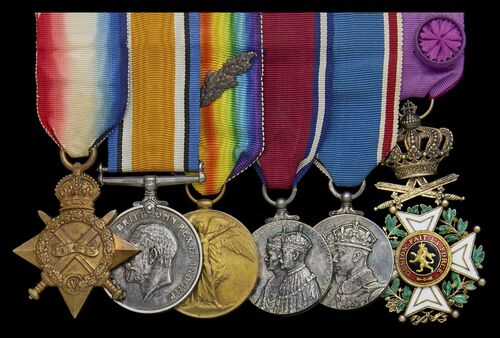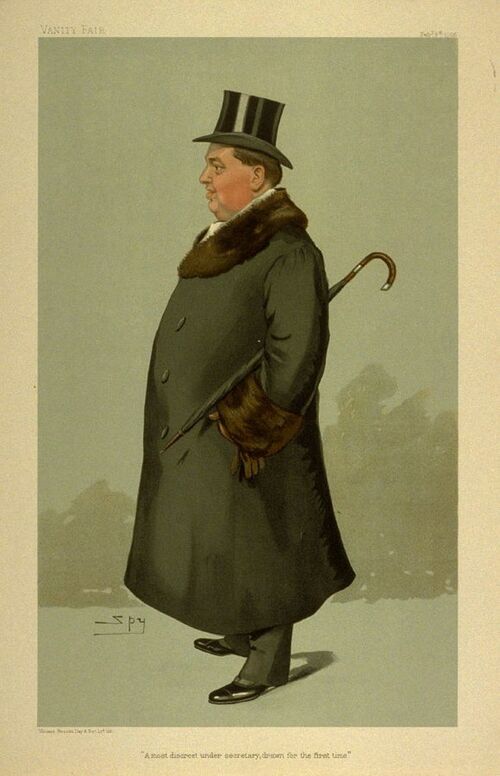Auction: 24002 - Orders, Decorations and Medals
Lot: 114
The group of six to Colonel the Earl of Donoughmore, K.P., K.St.J., British Red Cross Society, who served on the Society’s War Committee, and was twice Mentioned in Despatches
1914-15 Star (Earl of Donoughmore.); British War and Victory Medals, with M.I.D. oak leaves (Earl of Donoughmore.); Jubilee 1935; Coronation 1937; Belgium, Kingdom, Order of Leopold, Military Division, Officer’s breast badge, silver-gilt and enamel, mounted as worn, generally very fine (6)
[K.P.] conferred 1916.
K.St.J. London Gazette 31 July 1917.
M.I.D. London Gazette 4 January 1917; 24 December 1917.
Belgium, Order of Leopold Edinburgh Gazette 29 March 1921.
Richard Walter John Hely-Hutchinson, 6th Earl of Donoughmore, was born on 2 March 1875, the son of John Hely-Hutchinson, 5th Earl of Donoughmore, and Frances Isabella Stephens. He was educated at Eton and later at New College, Oxford. He succeeded to the Earldom in 1900, and then served briefly as a Captain in the 3rd (Militia) Battalion, Royal Irish Regiment. Taking his seat in the House of Lords, he served as Under-Secretary of State for War from 1903-05, and in 1913 was elected Grand Master of the Grand Lodge of Ireland on the death of His Grace the Duke of Abercorn.
During the Great War, Lord Donoughmore was a Commissioner of the British Red Cross Society’s War Committee, and had the honorary rank of Lieutenant-Colonel from 10 August 1915 and saw service in France from that date. For his Great War services he was twice Mentioned in Despatches (London Gazette 4 January & 24 December 1917) and was promoted honorary Colonel. He was also part of the Mesopotamia Commission of Inquiry. He was created a Knight of the Order of St. Patrick in 1916, and appointed to the Privy Council in 1918.
In June 1920, he was one of three candidates for the post of Governor-General of Australia presented to the Australian prime minister Billy Hughes, along with Lord Forster and General Seely. In 1921 Lord Donoughmore was elected one of the fifteen Peers of the Realm resident in the South (elected by a constituency of all Southern Ireland peers) to be a member of the Senate of Southern Ireland under the Government of Ireland Act 1920. The Senate convened in 1921 but was boycotted by Irish nationalists, Donoughmore did not attend its first meeting. In 1929 he chaired the Committee on Ministers' Powers following Viscount Hewart's controversial book, The New Despotism, in which Hewart asserted that the rule of law in Britain was being undermined by the executive at the expense of the legislature and the courts. The book was very controversial and led to the committee, and the report rejected Hewart's arguments. He also led the Donoughmore Commission in 1927 that recommended a new way of governing Ceylon (now Sri Lanka), introducing universal suffrage and trying to involve each ethnic group fairly.
He had been a keen actor during his time at Oxford and was fond of the theatre when in London, he was additionally a member of the Garrick and Beefsteak Club.
Donoughmore broke his leg while driving to the House of Lords in February 1948 and never fully recovered from this accident. He died on 19 October 1948, at Knocklofty, Clonmel, Cork, Ireland and a Memorial Service was held in St. Patrick's Cathedral, Dublin. He was succeeded to the earldom by his son, John Hely-Hutchinson, 7th Earl of Donoughmore; sold with a copy of the Freemasons' Calendar 1937 and assorted copied research.
Subject to 20% VAT on Buyer’s Premium. For more information please view Terms and Conditions for Buyers.
Sold for
£3,500
Starting price
£1400









